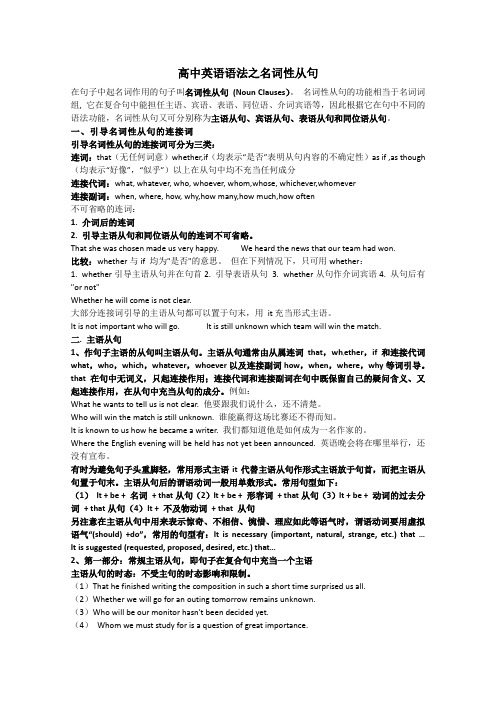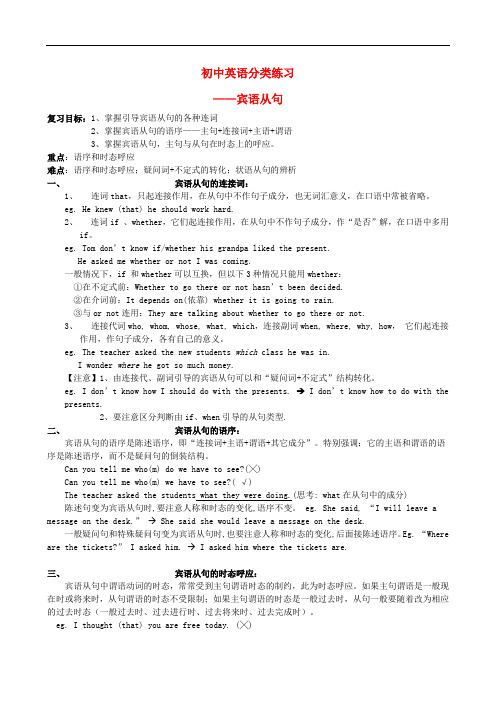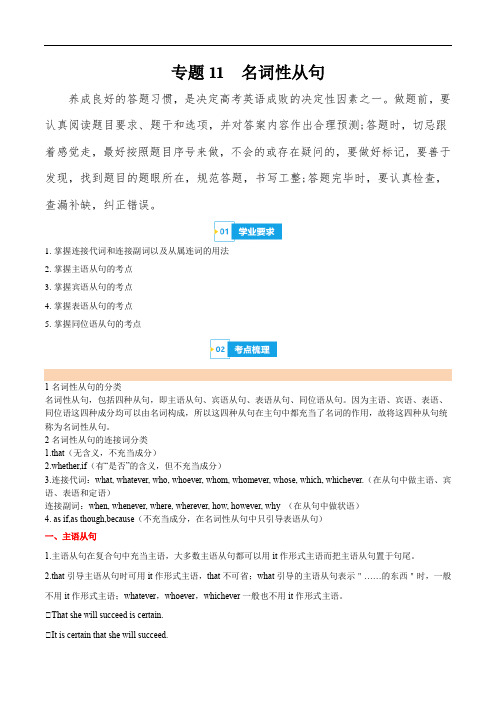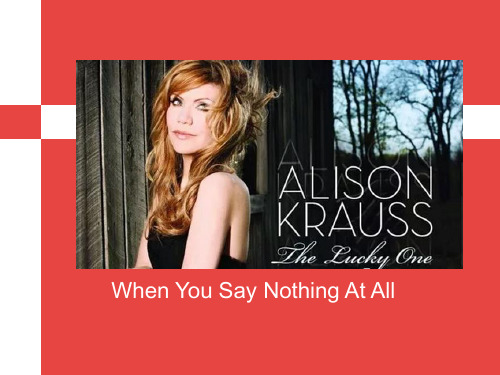what 与that 的讲与练
高考英语语法名词性从句讲与练

高中英语语法之名词性从句在句子中起名词作用的句子叫名词性从句(Noun Clauses)。
名词性从句的功能相当于名词词组, 它在复合句中能担任主语、宾语、表语、同位语、介词宾语等,因此根据它在句中不同的语法功能,名词性从句又可分别称为主语从句、宾语从句、表语从句和同位语从句。
一、引导名词性从句的连接词引导名词性从句的连接词可分为三类:连词:that(无任何词意)whether,if(均表示“是否”表明从句内容的不确定性)as if ,as though (均表示“好像”,“似乎”)以上在从句中均不充当任何成分连接代词:what, whatever, who, whoever, whom,whose, whichever,whomever连接副词:when, where, how, why,how many,how much,how often不可省略的连词:1. 介词后的连词2. 引导主语从句和同位语从句的连词不可省略。
That she was chosen made us very happy. We heard the news that our team had won.比较:whether与if 均为"是否"的意思。
但在下列情况下,只可用whether:1. whether引导主语从句并在句首2. 引导表语从句3. whether从句作介词宾语4. 从句后有"or not"Whether he will come is not clear.大部分连接词引导的主语从句都可以置于句末,用it充当形式主语。
It is not important who will go. It is still unknown which team will win the match.二. 主语从句1、作句子主语的从句叫主语从句。
主语从句通常由从属连词that,wh ether,if和连接代词what,who,which,whatever,whoever以及连接副词how,when,where,why等词引导。
宾语从句用法详解 史上最小白的讲解与练习

初中英语分类练习——宾语从句复习目标:1、掌握引导宾语从句的各种连词2、掌握宾语从句的语序——主句+连接词+主语+谓语3、掌握宾语从句,主句与从句在时态上的呼应。
重点:语序和时态呼应难点:语序和时态呼应;疑问词+不定式的转化;状语从句的辨析一、宾语从句的连接词:1、连词that,只起连接作用,在从句中不作句子成分,也无词汇意义,在口语中常被省略。
eg. He knew (that) he should work hard.2、连词if 、whether,它们起连接作用,在从句中不作句子成分,作“是否”解,在口语中多用if。
eg. Tom don’t know if/whether his grandpa liked the present.He asked me whether or not I was coming.一般情况下,if 和whether可以互换,但以下3种情况只能用whether:①在不定式前:Whether to go there or not hasn’t been decide d.②在介词前:It depends on(依靠) whether it is going to rain.③与or not连用:They are talking about whether to go there or not.3、连接代词who, whom, whose, what, which,连接副词when, where, why, how,它们起连接作用,作句子成分,各有自己的意义。
eg. The teacher asked the new students which class he was in.I wonder where he got so much money.【注意】1、由连接代、副词引导的宾语从句可以和“疑问词+不定式”结构转化。
eg. I don’t know how I should do with the presents. →I don’t know how to do with the presents.2、要注意区分判断由if、when引导的从句类型.二、宾语从句的语序:宾语从句的语序是陈述语序,即“连接词+主语+谓语+其它成分”。
高中英语学业水平考试必备考点归纳与测试:专题11 名词性从句(知识梳理+考点精讲精练)(原卷版)

专题11 名词性从句养成良好的答题习惯,是决定高考英语成败的决定性因素之一。
做题前,要认真阅读题目要求、题干和选项,并对答案内容作出合理预测;答题时,切忌跟着感觉走,最好按照题目序号来做,不会的或存在疑问的,要做好标记,要善于发现,找到题目的题眼所在,规范答题,书写工整;答题完毕时,要认真检查,查漏补缺,纠正错误。
1.掌握连接代词和连接副词以及从属连词的用法2.掌握主语从句的考点3.掌握宾语从句的考点4.掌握表语从句的考点5.掌握同位语从句的考点1名词性从句的分类名词性从句,包括四种从句,即主语从句、宾语从句、表语从句、同位语从句。
因为主语、宾语、表语、同位语这四种成分均可以由名词构成,所以这四种从句在主句中都充当了名词的作用,故将这四种从句统称为名词性从句。
2名词性从句的连接词分类1.that(无含义,不充当成分)2.whether,if(有“是否”的含义,但不充当成分)3.连接代词:what, whatever, who, whoever, whom, whomever, whose, which, whichever.(在从句中做主语、宾语、表语和定语)连接副词:when, whenever, where, wherever, how, however, why (在从句中做状语)4. as if,as though,because(不充当成分,在名词性从句中只引导表语从句)一、主语从句1.主语从句在复合句中充当主语,大多数主语从句都可以用it作形式主语而把主语从句置于句尾。
2.that引导主语从句时可用it作形式主语,that不可省;what引导的主语从句表示"……的东西"时,一般不用it作形式主语;whatever,whoever,whichever一般也不用it作形式主语。
☞That she will succeed is certain.☞It is certain that she will succeed.注意:(1)在"It is necessary/important/strange/natural...+that从句"结构中,从句谓语常用"(should+)动词原形"形式。
高中英语教学竞赛公开课、高考复习课件——高中语法that与what引导名词性从句

Exercise
1. It was with great joy ______he received the news that his lost daughter had been found.
歌词宾语从句详解
2. The smile on your face let's me know that you need me.
(that you need me是宾语从句,作主句动词know的宾 语,由that引导,因为that在宾语从句中不作任何成分, 也无含义)
歌词宾语从句详解
3. The touch of your hand says you'll catch me if ever I fall.
7.—It’s thirty years since we last met. —But I still remember the story, believe it or not,
_____we got lost on a rainy night. A. which B. that C. what D. when
A. if B. when C. that D. which
Keys
答案: 1-5 DDAAB 6-11 CBBABC
高考质量提升是一项系统工程,涉及到多个方面、各个维度,关键是要抓 住重点、以点带面、全面突破,收到事半功倍的效果。
一、备考策略务必精准
高三备考的不同阶段,目标和任务各不相同,就像打仗一样,攻克不同的 山头有不同的打法,只有抓住要领,才能打赢主动仗。 一是细化“作战地图”
初中英语宾语从句讲解、练习与答案[1]
![初中英语宾语从句讲解、练习与答案[1]](https://img.taocdn.com/s3/m/62052a39d15abe23492f4d62.png)
(完整word)初中英语宾语从句讲解、练习与答案(word版可编辑修改) 编辑整理:尊敬的读者朋友们:这里是精品文档编辑中心,本文档内容是由我和我的同事精心编辑整理后发布的,发布之前我们对文中内容进行仔细校对,但是难免会有疏漏的地方,但是任然希望((完整word)初中英语宾语从句讲解、练习与答案(word版可编辑修改))的内容能够给您的工作和学习带来便利。
同时也真诚的希望收到您的建议和反馈,这将是我们进步的源泉,前进的动力。
本文可编辑可修改,如果觉得对您有帮助请收藏以便随时查阅,最后祝您生活愉快业绩进步,以下为(完整word)初中英语宾语从句讲解、练习与答案(word版可编辑修改)的全部内容。
宾语从句(一)宾语从句的种类1。
由that引导的宾语从句。
that只有语法作用,没有实在的意义,在口语和非正式文体中可以省略。
例如:He said (that) he wanted to stay at home.She doesn’t know (that) she is seriously ill。
I am sure (that) he will succeed.2。
由连接代词who, whom, whose, what, which和连接副词when, where,why, how引导的宾语从句。
这些连接代词和连接副词在宾语从句中充当某个成分.例如:Do you know who (whom) they are waiting for?He asked whose handwriting was the best.Can you tell me where the No。
3 bus stop is?I don’t know why the train is late。
3. 由if或whether引导的宾语从句。
if和whether在句中的意思是“是否”。
例如:I want to know if (whether) he lives there.He asked me whether (if) I could help him。
what用法归纳与总结高三

what用法归纳与总结高三高三的同学们,咱们今天来好好唠唠“what”这个词的用法。
先说说我之前遇到的一件事儿吧。
有一次我在课堂上讲“what”的用法,有个同学听得特别认真,眼睛都不眨一下。
我讲完之后让大家做练习,这位同学做得那叫一个又快又准。
我就好奇地问他怎么掌握得这么好,他说他之前一直被“what”的各种用法搞得晕头转向,这次下定决心要搞清楚。
咱们言归正传,“what”在高三的学习中可是个重要角色。
“what”用作疑问代词时,主要用来询问事物的性质、内容、职业或身份等。
比如说,“What is your name?”这就是在问你的名字是什么。
再比如,“What color is your dress?”这是在问裙子的颜色。
“what”还能引导名词性从句。
在宾语从句中,“I don't know what he wants”这里“what he wants”就是宾语从句,作“know”的宾语,表示“我不知道他想要什么”。
在主语从句中,“What you said is very important”这里“what you said”就是主语从句,整个句子意思是“你说的话非常重要”。
还有表语从句,像“This is what I need” “what I need”在这里作表语,表示“这就是我需要的”。
咱们来做几道题巩固一下。
比如这道题:“_____ he said at the meeting astonished everyone present” 这就得用“What”,因为“_____ he said at the meeting ”是主语从句,在从句中缺少宾语,所以用“what”。
再看这道:“The problem is _____ we don't have enough t ime” 这里就得用“that”,因为整个句子不缺成分,意思完整。
同学们,“what”的用法虽然有点多,但只要咱们多练习、多总结,就一定能掌握得牢牢的。
高考英语语法高中英语语法-关系代词讲与练
高考英语语法:高中英语语法-关系代词讲与练《高中英语语法-关系代词讲与练》由英语编辑整理,更多请访问:。
本内容整理时间为05月12日,如有任何问题请联系我们。
关系代词讲与练一、关系代词who, whom, whose, which, that引导定语从句的基本用法:1. who/whom/that三者都可指代人: who作主语, whom 作宾语, that既可以作主语,又可作宾语。
如:He is a good teacher who/that is loved by all.Here is the man (whom) you are looking for.注意:①在口语中, who 可以代替whom作宾语。
②关系代词在定语从句中作宾语时,一般可省略。
2. whose 可修饰人,也可修饰物;修饰物时,可与of which换用,whose 在定语从句中作定语。
如:I saw some trees whose leaves were black with diseases.= I saw some trees the leaves of which were black with diseases.3. that/which/that/which指代物,在定语从句中可作主语或宾语。
如:Emei is a wonderful place which/that is worth visiting.The film (which/that) we saw last night is wonderful.二、须特别注意以下几种特殊情况:1. 常用that 不用which的情况:① 先行词为all, anything, everything, nothing, something等时。
如:I will do all (that) I can to help you.② 先行词被序数词、形容词最高级或the only, the very等所修饰时。
特殊疑问句讲解与练习
特殊疑问句讲解与练习特殊疑问句是一种由疑问词引导的句子,不同的疑问词用于询问不同的对象。
这种句子的结构是“疑问词+一般疑问句的句式”,也就是“疑问词+系动词/助动词/情态动词+主语+其他成分”。
特殊疑问句不能用Yes或No来回答,而需要对所询问的对象有针对性地回答。
下面是一些常用的特殊疑问词及其用法:who:用于询问人的身份、姓名等。
例如,“Who is he?”whose:用于询问所属关系。
例如,“Whose book is this?”when:用于询问时间。
例如,“When do you play games?”where:用于询问地点。
例如,“Where do you play games on Sunday?”why:用于询问原因。
例如,“Why isn't he at school today?”which:用于在一定范围内特指的人或物。
例如,“Which box is yours?”what:用于询问人的职业或事物是什么。
例如,“What is he?”what color:用于询问颜色。
例如,“What color is your skirt?”what time:用于询问时间,相当于“几点”。
例如,“What time do you play games?”what day:用于询问星期几。
例如,“What day is it today?”how:用于询问健康状况、做事的方式、程度等。
例如,“How is he?”(问健康状况)I ride my bike to go home。
How do you usually commute。
The river is about 100 meters wide。
How deep is the river。
What is your age。
He is ten years old。
How many boys are there in your class。
Module7Unit2What'sthat?(课件)英语三年级上册(1)
What's that? It's a cake.
What's that? It's a cat.
What's that? It's a book.
What's this? It's a schoolbag.
What's that? It's a pencil.
What's that? It's a pen.
Tom:Oh!What's____t_h_a_t____? Amy: It's a ____c__a_t________!Ha ha...
角色扮演规则: 一人扮演小弟弟Tom,一人扮演Lingling。 先小组合作,再上台表演。 注意模仿好角色说话的语气,要带有感情。
1.坐好姿势认真听 2.跟着大声唱出来 3.举手唱一唱
Let's chant.
1.坐好姿势看课文视频 2.拿出你的笔唱一唱
1.观看课文视频,圈出生词 2.跟着课文视频配音读
新词新说唱
Hei yo it's a schoolbag School schoolbag School schoolbag Hei yo It's a ball I say ball ball ball, you say ball ball ball . Hei yo It's a book I say book book book, You say book book book. Hei yo yo say it again,say it again,say it again.
Module 7 Unit 2
What's that?
三年级上英语教案-Module7 Unit2 What’s that-外研社(三起)
三年级上英语教案-Module 7 Unit 2 What’s that-外研社(三起)教学目标1.能够听、说、认读并正确使用单词: bowl, plate, knife, fork, spoon, cup。
2.能够听懂并理解句型: What’s that? That’s abowl/plate/knife/fork/spoon/cup。
3.能够通过绘画讲述英语课。
教学重难点1.辨别和书写新学单词。
2.熟练掌握句型: What’s that? That’s abowl/plate/knife/fork/spoon/cup.教学准备1.课件及音频。
2.白纸和颜料。
教学过程Warm-up1.教师引入词汇: bowl, plate, knife, fork, spoon, cup。
2.师生互相问答训练新词汇。
Presentation1.教师用多媒体展示新物品的形象,学生们通过视觉形象认识新单词。
2.教师发音展示新单词,培养学生的听力和语感。
Practice1.教师播放音频,要求学生听写新单词以检验听力是否理解。
2.教师用说英文,学中英文的方法要求学生跟读新单词,以此来提高学生的口语能力。
Production1.为学生准备颜料和纸板,以使他们使用各种颜色热情地描绘出自己的bowl、plate、knife、fork、spoon、cup。
2.学生每次完成后,孩子们可以互相展示他们的绘画作品,并概述他们绘画中使用了什么样的单词和句型,鼓励学生积极表达。
Application1.在操场或教室内的学校角落里摆放各种杯碟餐具,并让学生尝试按照所学内容讲述和描述这些物品。
2.学生可以完成课堂任务和书后练习,考验自己的语言掌握能力,切实提高自己的英语水平。
教学反思通过本次教学,学生们能够利用生活中的实物来认知与学习词汇,拓宽了英语学习积累词汇表的范围,增强了学习英语的兴趣,增加了对英语学习的掌握信心。
同时,通过绘画作品和描述讲述,整个教学过程也增强了学生的语言表达能力,并提高了他们的想象和创造能力。
- 1、下载文档前请自行甄别文档内容的完整性,平台不提供额外的编辑、内容补充、找答案等附加服务。
- 2、"仅部分预览"的文档,不可在线预览部分如存在完整性等问题,可反馈申请退款(可完整预览的文档不适用该条件!)。
- 3、如文档侵犯您的权益,请联系客服反馈,我们会尽快为您处理(人工客服工作时间:9:00-18:30)。
• 4、Who / whoever, what / whatever 、 等的用法区别。 等的用法区别。 • 一般说来,what/who等含特指意义,而 whatever/whoever等含泛指意义,意为 “无论什么/无论谁”。例如 (NMET97): • It is generally considered unwise to give a child ____ he or she wants. • A. however B. whatever • C. whichever D. whenever
Unit 2 Grammar and usage(1)
wh-question 1. Where does a person come from?
This will affect their style of speech.
subject = Where a person comes from will
Written exercises for Noun clauses
X.Homework: C1 on page 94
Unit 2 Grammar and usage (2) ----Empty It
Nanjing University Attached High School Zhu Yunhui
1、引导词what与that的用法区别。 、引导词 的用法区别。 与 的用法区别 引导主、宾、表语从句时,what要充当 主语、宾语或表语等句子成分,that不 作任何成分,只在语法上起连接的作 用。例如(NMET’96): ____ we can’t get seems better than ____ we have. • A. What; what B. what; that • C. That; that D. That; what That the former Iraq president Saddam was captured has been proved.
wh-question
3.Why is English a langue with so many confusing rules?
predicative
This is the reason =This is why English is a language with so many confusing rules.
VII.宾语从句 在复合句中作主句的宾语.引导词有连词 在复合句中作主句的宾语 引导词有连词that (that 引导词有连词 常可省略),whether,if; 代词有 代词有who, 常可省略 whose,what ,which;副词 when ,where, how, 副词 why 等.如: 如 1.We believe (that) he is honest. 2.I asked if (=whether) they had a cheap suit. 3. Can you tell which dictionary is hers? 4. I really don’t know what he is doing.
1.The thought that we might success excited us. 2.The idea that they should try a second time is worth considering. 3.The suggestion that the plan (should) be delayed will be discussed tomorrow. 4.You have no idea how worried I was. 名词suggestion,advice.order等词后的同位语从句 名词 等词后的同位语从句 的谓语动词要用should+动词原形 动词原形,should可省略 可省略. 的谓语动词要用 动词原形 可省略
名词性从句的语序。 名词性从句的语序。 与别的从句一样,名词性从句必须用自然语 序,即使在疑问句中,从句也不倒装(而在 主句上倒装)。例如(MET91): • No one can be sure ____ in a million years. • A. what man will look like • B. what will man look like • C. man will look like what • D. what look will man like
VIII.表语从句 在复合句中作主句的表语.引导词有连词 在复合句中作主句的表语 引导词有连词that (that 引导词有连词 不可省),whether; 代词有 代词有who, what ,which;副词 不可省 副词 when ,where, how, why 等.如: 如 The problem is that we didn’t get in touch with him. This is how Henry solved the problem. His suggestion is that we (should) finish the work at once.
a 3. Ask her _____ come with us. a. If she will b. if will she c. whether she d. whether will she d 4. _____ we can’t understand is_____ he didn’t join us in our discussion. • a. That; why b. Which; how • c. What; what d. What; why
1. We can use it as an empty subject A.when we use a noun clause as the subject of a sentence.
a. ( preferable) It is certain that we would not be able to understand Old English today.= ( correct) That we would not be able to understand Old English today is certain. b. ( preferable) It is easy to answer whether English will continue changing in the future.= ( correct) Whether English will continue changing in the future is easy to answer. c.( preferable) It depends on the style of writing when we use certain words.= ( correct) When we use certain words depends on the style of writing.
IV.Exnswers: A.1. O 2. S 3. P 4. O 5. O 6. P B.1. why 2. what 3.which 4.how/why 5. How 6.who 7. How 8. Which
V.Choose the best answer a 1.---Do you remember ______ he came? ---Yes,I do. He came by car. a.how b. when c. that d. if b 2. _____ we’ll go camping tomorrow depends on the weather. a.If b. Whether c. That d. Where
affect their style of speech.
wh-question
2.Why does English have such strange rules? You can begin to see it! =You can begin to see
object
why English has such strange rules!
Where, when, why等连接副词引导的 等连接副词引导的 名词性从句。 名词性从句。Where, when, why等连接 副词也可以引导名词性从句,使用的关 键是:这个词必须符合句子的逻辑要求。 例如(NMET’99): NMET’99 • — I drove to Zhuhai for the air show last week. • — Is that ____ you had a few days off? • A. why B. when C. that D. where
3. Word has came __________ some American guests will come for a visit. • A. what B. that • C. whether D. when
4.______ knows the truth will tell you about it. • Who that B. Whoever • C. Whom that D. That who
I. Revision
1. It’s a book.(指代 指代) 指代 2. It’s eight o’clock.(时间 时间) 时间 3. It’s cold outside.(天气 天气) 天气 4. It’s a long way to the museum. (距离 距离) 距离
II. Empty subject it
VI.主语从句 在复合句中作主句的主语.引导词有连词 在复合句中作主句的主语 引导词有连词that (that 引导词有连词 不可省),whether; 代词有 代词有who, what ,which;副词 不可省 副词 when ,where, how, why 等.如: 如 1.That he is a famous singer is known to us. (It is known to us that he is a famous singer.) 2.When he will go to America is not yet fixed. (It is not yet fixed when he will go to America.) 3.Whether she’s coming or not doesn’t matter too much. (not if) (It doesn’t matter too much whether she’s coming or not.)
